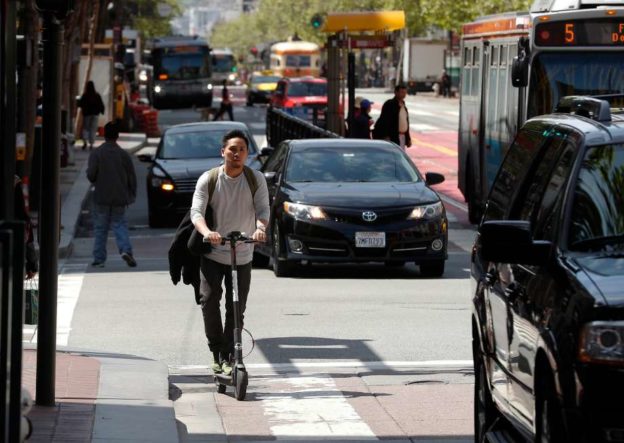For once, it’s not just about bikes.
The latest disruptions in the shared mobility revolution hit the headlines this week, with Slate, Wired and other major news outlets reporting on the pushback against the largely unregulated deployment of shared electric scooters in San Francisco. The City Attorney there has issued a cease and desist order against Bird, LimeBike and Spin while the Board of Supervisors decides how to regulate them.

For bike advocates, this story is familiar — bike share systems are controversial — and more complicated than it may seem. Scooter share could help people get out of their cars, and that would be good for people on bikes. But that hasn’t been the case so far with Uber and Lyft – they’re putting more cars on the street while luring customers away from public transit. It’s possible scooter share won’t attract drivers but instead attract people who don’t want to wait for the bus.

The conflicts created for pedestrians when share scooters are parked and ridden on sidewalks (riding them on sidewalks is illegal in California) put pressure on cities to provide bike lanes and quieter streets where they can be legally ridden. That’s hardly a bad thing for people on bikes. We definitely need more bike lanes, especially protected bike lanes. And anyway, if bicycling continues to boom, they’ll be busier. How much does it matter if we share them with e-scooters too?
When that pressure comes from the business community and companies like Bird, LimeBike and Spin, that’s also a good thing. Providing for more and better transportation options should be everyone’s business, and not just what organizations like SABA talk about.
But should local government be expected to pay for the infrastructure where companies like Bird, LimeBike and Spin run their business and, presumably, make their fortunes? Airlines pay fees that help cover the cost of building and maintaining publicly owned airports. What should we be asking from Bird, LimeBike and their competitors – especially when they operate (or prefer to operate) without any regulation, including payment of permit fees? This was the crux of the debate over AirBnB a few years back.

The endgame for companies like Bird, LimeBike and Spin –- or rather, for the venture capitalists who fund them — is autonomous vehicles. By deploying shared bikes and scooters, these companies are getting a feel for their customers, testing the user interface and learning how to navigate the regulatory landscape. So don’t be surprised if you see LimeBike turn away from bike share entirely (we’ve been hearing that rumor) while the business model continues to morph.
For those of us devoted to making transportation healthful and safe and creating human-scale cities, it may be a bumpy ride in the meantime.

